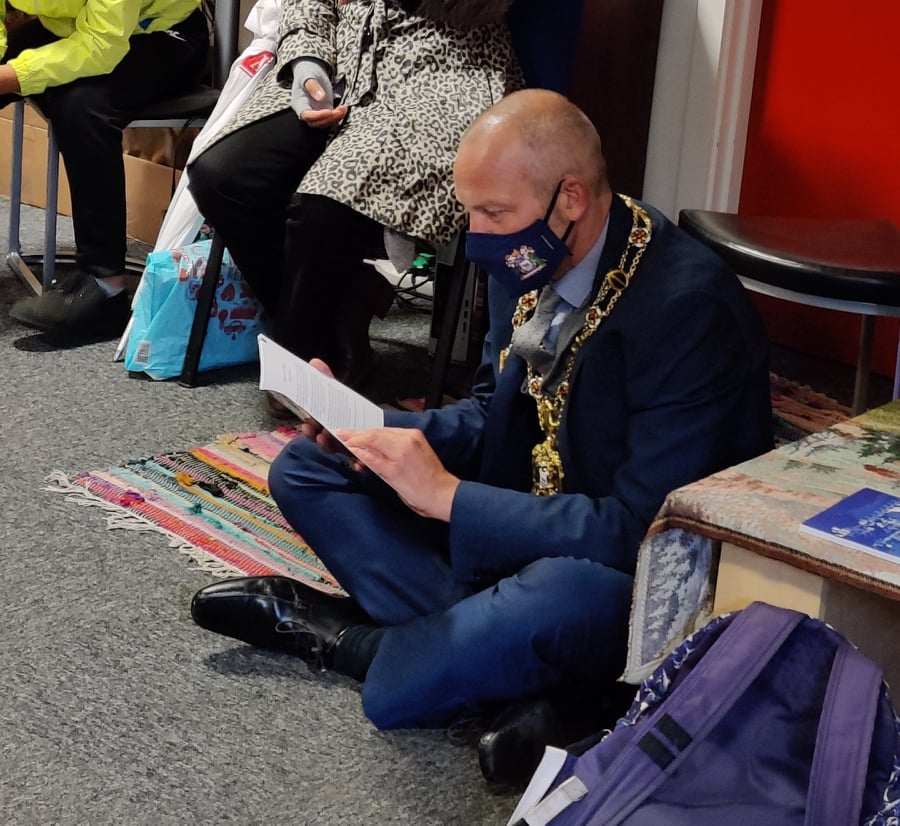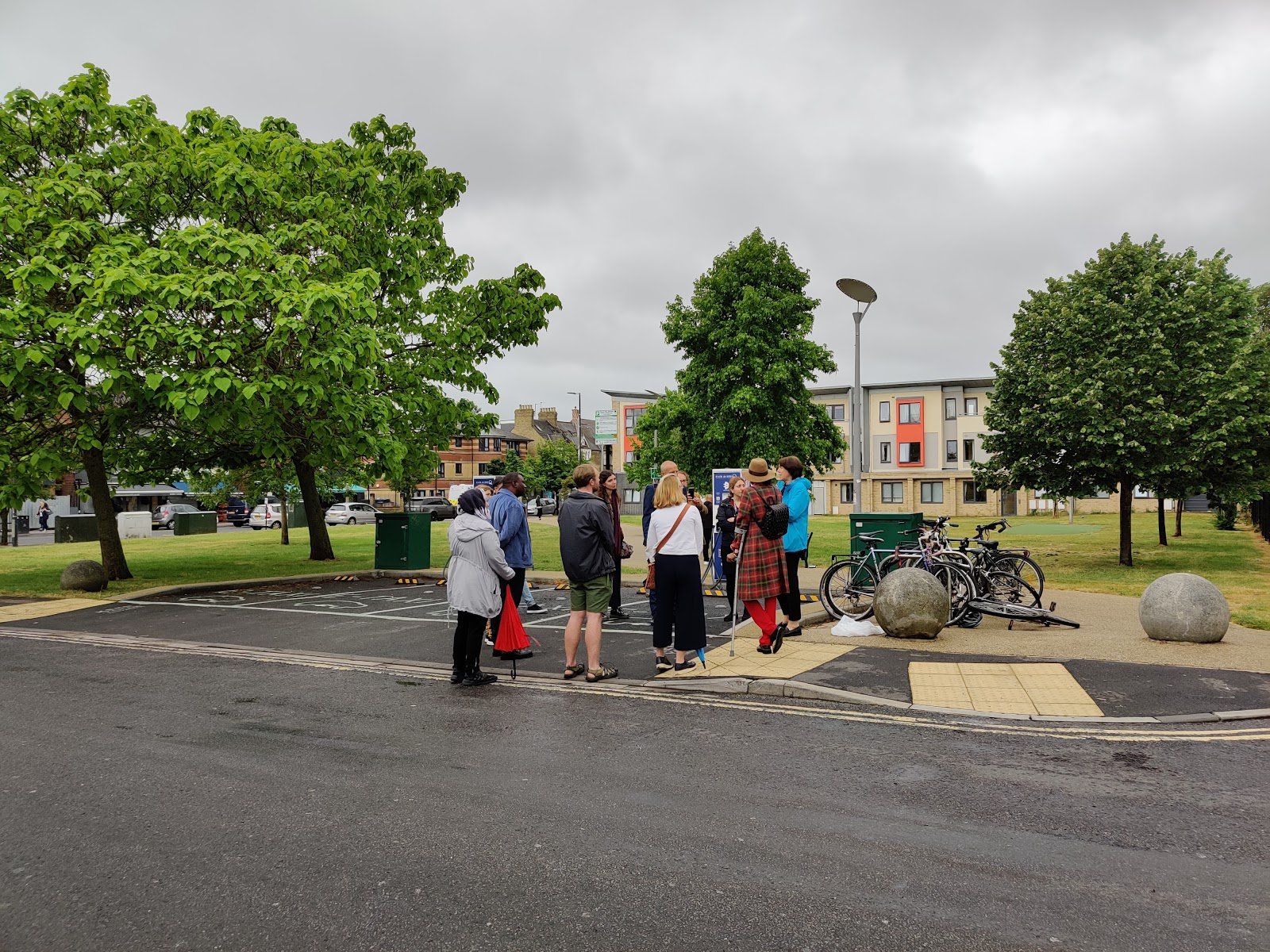On the drizzly Friday afternoon of 18th June, six local Oxford residents who are also refugees or asylum seekers doubled as tour guides and took local community and political leaders around organisations and locations that were vital to them as newcomers in the community. Among those present were Lord Mayor of Oxford, Councillor Mark Lygo, and five other Oxford City Councillors.
The walking tour was organised by Asylum Welcome, an Oxford-based charity for refugees and asylum seekers, to give local leaders a glimpse into the experiences of refugees living in Oxford.
The walk spanned seven locations: Asylum Welcome’s office; The Porch, a homelessness service that provides food parcels to refugees; Oxford Mutual Aid, an organisation that provides emergency food parcels; Restore, a mental health charity; East Oxford Community Centre, a centre with an “Open Door” café for refugees; Refugee Resource, a charity that specialises in trauma therapy and women’s support; and Za’atar Bake, a popular Cowley café and bakery where Asylum Welcome’s tour guides and staff members, staff from other Oxford refugee charities, and the City Councillors all sat down to share food and reflections.
Refugees as partners, not participants
A recurring message in the walk was how refugees can enrich the cultural, economic, and social lives of the communities they find themselves in.
“Refugees are not participants in the community, they are partners,” said Maya, a refugee from Kenya. Five years since she first came to the UK to seek asylum, Maya is now pursuing a Bachelor’s degree in Community Development and Youth Work at Ruskin College. She has also completed a placement at Asylum Welcome.
“So much of the dialogue [about refugees] today is so negative,” said Holywell Councillor Edward Mundy, who also volunteers at Asylum Welcome, working on education initiatives. He said he was worried about when discourse surrounding refugees goes “too far the other way”, when “people think of refugees as people who are needy without anything to offer.”
Michael, a Zimbabwean asylum-seeker, shared about how during the COVID-19 lockdown, he drove around delivering free food parcels to the community. During the Christmas holiday, he also helped with Pitt Rivers Museum’s Multaka-Oxford project, a project that relies on volunteers to give tours, provide perspectives, and conduct research about a collection of Islamic scientific instruments and Arabic textiles.
Michael has been waiting for an asylum decision from the Home Office since 2014. As an asylum-seeker, apart from £39.63 per week on a payment card for essentials, he has “no recourse to public funds” (NRPF) and no legal right to paid work.
“Despite our hardships, we are still able to smile, go out, and help the community we live in,” Michael said.
Multiple Councillors criticised the NRPF policy when interviewed after the walk. Donnington Councillor Lucy Pegg, St Mary’s Councillor Chris Jarvis, and Holywell Councillor Imogen Thomas all stressed that barring asylum seekers from public funds, and therefore from benefits, and housing assistance also limits how much local Councillors can help these constituents. “The central government has ripped away the ability for local governments to do meaningful things that will improve people’s lives,” Jarvis said.
Pegg saw one of her responsibilities as “mak[ing] sure that everyone in our community knows that they can come to councillors for help”, and encouraged fellow councillors to direct refugees and asylum seekers “in the direction of the services that do exist”. Thomas emphasised what Councillors could do to provide support “as citizens”, including “volunteering, listening to stories, and following up on whatever [one] can do.”

The New Plan for Immigration
The walk took place in the context of the UK Government’s plan to overhaul its immigration and asylum system, which carries potentially immense ramifications for refugees and asylum seekers. In March, the Home Office announced its New Plan for Immigration, which was open to public consultation for six weeks and expects to be brought before Parliament in the autumn.
Among the Plan’s proposed measures are the branding of asylum seekers who pass through a “safe country” before reaching the UK as “illegal” and “inadmissible”, as well as sending them to reception centres with “basic accommodation” to be — wherever possible — removed from the UK. Asylum Welcome has raised concerns about the use of these centres, saying that they are “unsafe, crowded, often remote, with no Wi-Fi” and “unsuitable for those who have been through traumatic situations.”
“[The Plan] is criminalising migration. It is criminalising suffering,” said Councillor Mundy.
During the walk, tour guide Maya described her experiences in an immigration detention centre as “traumatic” and “abusive” as she suffered from mental health issues and was refused vital medication by the authorities, to the extent that she “didn’t know who she was”. A medical justice doctor later successfully intervened for her release from the facility.
Nine immigration detention centres are currently used by the Home Office to house foreign nationals awaiting asylum decisions or deportation. According to The Migration Observatory, in 2019, 24,400 people entered immigration detention in the UK, the lowest number since 2009. Around one-third of immigration detainees are held for longer than 28 days. Campsfield House, an immigration detention center in Kidlington, Oxfordshire, was closed in 2018 after a 25-year long battle by local activists.
Oxford as a Sanctuary City
At Za’atar Bake, Thomas, a Labour Councillor, reiterated her support for Oxford’s City of Sanctuary status, which the Council voted to declare in 2008: “I am very happy that Oxford is a City of Sanctuary. We welcome people, and we do not abide by hostile, Tory policies on immigration.”
The tour guides also reflected on how they benefited from Oxford’s support for refugees. Maya positively highlighted the city’s network of services of local charities and organisations, calling Oxford “a city that helps refugees”. Muradi, a refugee from Syria, spoke about her family’s struggle to find a safe place, describing their flight to the UK as “a dream becoming real”. She also compared receiving the hospitality of Asylum Welcome to being “in my parents’ house”, and called for “more government support” for the charity.
Guides and staff at refugee-supporting charities voiced ways for Oxford to improve conditions for refugees and asylum seekers as well. Sushila Dhall, Capacity Building Lead and Counsellor at Refugee Resource, strongly urged for more “good, safe, secure housing” options for newcomers, pointing out that refugees, including those with children, sometimes stay on the streets or in unfit housing with abusive households.

A Day Of Listening
“Today has been a day of listening”, Councillor Thomas reflected after the tour.
She described a personal conversation with one of the tour guides, who asked her how many siblings she had. “I said, one, only to realise that the person I was speaking to lives in a different country from her family,” Thomas recounted. “[This] everyday question actually had a sad history behind it. Digging a bit deeper, they also unfortunately had to miss the passing of their father. I can’t imagine how painful it must be to grieve in a different country from your loved one.”
For Councillor Pegg, the walk showed her the “on-the-ground action” happening in Oxford to “help migrants and refugees navigate a system that just seems to be built against them” and helped bring home “the human side” to refugee stories.
Also important, Pegg stated, was the necessity for fellow Oxford residents to remember the interconnectedness between themselves and refugees who share their community. She cites the example of global climate change, one of her core concerns as a Green Party Councillor, noting how it impacts the rise in numbers of asylum seekers and refugees, many of whom are from developing countries.
“Refugees and migrants have specific problems, but they also experience the same problems that all other people living in Oxford experience. It’s all linked up to the broader things that we face.”
Image: Joshua Low
This article has been updated on 3/7/2021 to clarify Michael’s situation.


